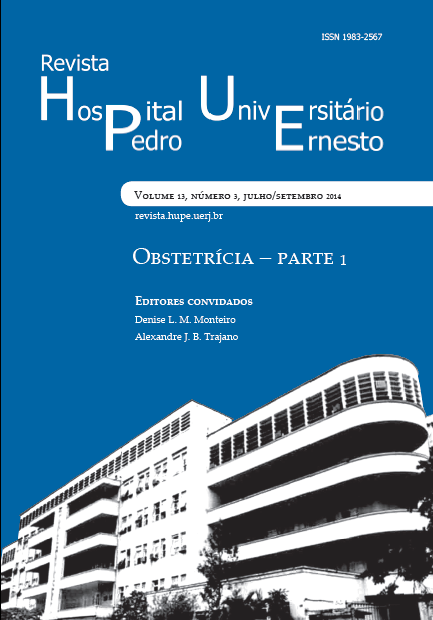Complicações fetais em gestações tardias
DOI:
https://doi.org/10.12957/rhupe.2014.12123Resumo
Em virtude de mudanças sociais e no estilo de vida, a incidência de gestação tardia, em mulheres com mais de 35 anos, aumentou significativamente nas últimas décadas. Tal aumento contribuiu para taxas mais altas de complicações obstétricas e fetais. Foi realizada uma revisão crítica da literatura com o objetivo de avaliar a evidência disponível sobre a frequência das principais complicações gestacionais em gestações tardias, assim como possíveis explicações e controvérsias sobre o tema. A busca detalhada da literatura foi realizada incluindo as bases de dados: Medline (pelo PubMed), SciELO e LILACS. Os desfechos gestacionais e perinatais avaliados foram: idade gestacional no parto, baixo peso ao nascer (BPN < 2,5 kg), índice de Apgar < 7 no 1º e no 5º minutos, aumento na incidência de cesarianas e natimortalidade. Os resultados obtidos foram: idade gestacional no parto (< 37 sem = de 3,4 a 51,4%; > 42 sem = de 0,4 a 6,9%), natimortalidade (de zero a 3,2%), BPN (de zero a 26,8%), Apgar < 7 (1º minuto = de 5,6 a 22,9%; 5º minuto = de 0,9 a 5%), taxa de cesarianas (de 31,9 a 72,4%). O impacto relativo ao aumento da idade materna e doenças crônicas nos desfechos gestacionais requer mais pesquisas. Profissionais de saúde devem estar em alerta para as particularidades das gestações tardias a fim de identificar potenciais complicações a tempo. Uma equipe multiprofissional especializada deve estar disponível para garantir as necessidades específicas em termos de exames e internações. Desta forma, as gestações tardias podem ser conduzidas de maneira mais segura, reduzindo taxas de complicações e desfechos adversos maternos e perinatais.Descritores: Idade materna; Lactente; Baixo peso ao nascer; Índice de Apgar; Natimortalidade; Complicações na gravidez.
Descritores: Idade materna; Lactente; Baixo peso ao nascer; Índice de Apgar; Natimortalidade; Complicaçõesna gravidez.
Revista HUPE, Rio de Janeiro, 2014;13(3):11-16
doi: 10.12957/rhupe.2014.12123


